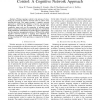Free Online Productivity Tools
i2Speak
i2Symbol
i2OCR
iTex2Img
iWeb2Print
iWeb2Shot
i2Type
iPdf2Split
iPdf2Merge
i2Bopomofo
i2Arabic
i2Style
i2Image
i2PDF
iLatex2Rtf
Sci2ools
ICC
2007
IEEE
2007
IEEE
Joint Power and Channel Minimization in Topology Control: A Cognitive Network Approach
Abstract— Wireless topology control is the process of structuring the connectivity between network nodes to achieve some network-wide goal. This paper presents a cognitive network approach to achieving the objectives of power and spectrum management. We cast the problem as a two phased noncooperative game and use the properties of potential game theory to ensure the existence of, and convergence to, a desirable Nash Equilibrium. Although this is a multi-objective optimization and the spectrum management problem is NP-hard, this selfish cognitive network constructs a topology that minimizes the maximum transmission power while simultaneously using, on average, less than 12% extra spectrum, as compared to the ideal solution.
| Added | 02 Jun 2010 |
| Updated | 02 Jun 2010 |
| Type | Conference |
| Year | 2007 |
| Where | ICC |
| Authors | Ryan W. Thomas, Ramakant S. Komali, Allen B. MacKenzie, Luiz A. DaSilva |
Comments (0)

